Most Americans think the U.S. should prioritize the development of renewable energy over fossil fuel sources. At the same time, most say they are not ready to stop using fossil fuel energy sources altogether. And a sizable share think the U.S. should never stop using fossil fuel sources.
Renewable sources, such as wind and solar, are expected to make up a growing share of the U.S. energy supply relative to fossil fuel sources such as oil, coal and natural gas in coming years. Last year renewable energy sources, including wind, solar and hydropower, generated more electricity than coal in the U.S. Legislation passed during the Biden administration, such as the Inflation Reduction Act, are expected to increase the pace of an energy transition.
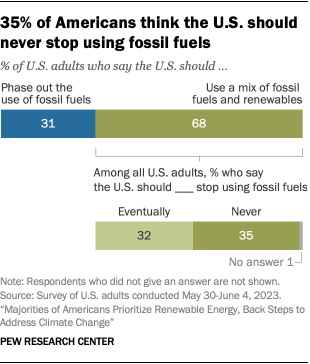
In the new survey, 67% of Americans say the U.S. should prioritize developing alternative energy sources, such as wind, solar and hydrogen technology, while 32% say the priority should be expanding the exploration and production of oil, coal and natural gas.
Read the Appendix for more on this question, including a shift away from renewables among Republicans that occurred at the outset of the Biden administration.
While the public prioritizes renewable energy development, just 31% say they are ready to phase out the use of oil, coal and natural gas completely. A much larger share (68%) say the U.S. should continue to use fossil fuels, alongside renewables, as part of the mix of energy sources the country relies on.
The roughly two-thirds of Americans who support using a mix of renewables and fossil fuels are closely divided over whether the U.S. should ever stop using oil, coal and natural gas: 32% of Americans favor a mix of sources now but think the U.S. should eventually stop using fossil fuel energy sources, while 35% favor using a mix of sources now and say the U.S. should never stop using oil, coal and natural gas.
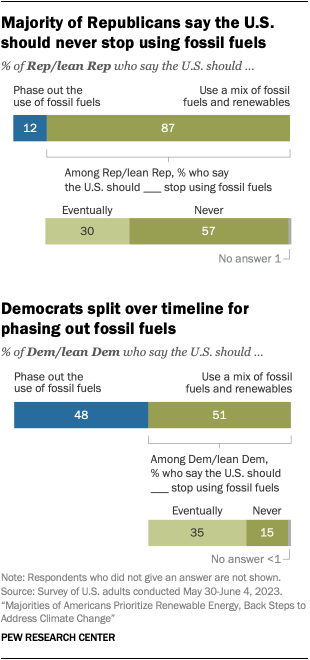
Republicans and Democrats offer very different views on what role oil, coal and natural gas should play in the country’s energy landscape.
An overwhelming majority of Republicans and Republican leaners (87%) think the U.S. should use a mix of fossil fuel and renewable energy sources. Looking ahead, 57% of Republicans believe the U.S. should never stop using oil, coal, and natural gas.
In contrast, most Democrats and Democratic leaners think the U.S. should end the use of fossil fuels, but there are some differences in views over the timeline.
About half of Democrats (48%) are ready to phase out fossil fuels now; another 35% think they should be part of the mix currently, but that the country should eventually stop using them. A relatively small share of Democrats (15%) say the country should never stop using oil, coal and natural gas.
Public expectations on how a renewable energy transition would impact the country
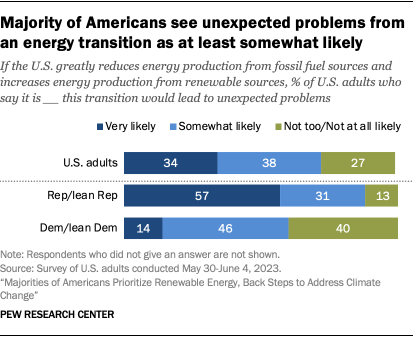
Americans think a major shift from fossil fuels to renewable energy sources in the U.S. would come with some difficulties for the country. But they also see potential benefits, such as improved air and water quality and a more positive than negative impact on jobs in the energy sector.
Still, many worry that an energy transition would push consumer prices higher. As with views on energy sources generally, Republicans and Democrats have quite different expectations for what a renewable energy transition would bring for the U.S.
Overall, 34% say the country would be very likely to encounter unexpected problems if the U.S. greatly reduces energy production from fossil fuels while increasing production from renewable sources; another 38% say unexpected problems would be somewhat likely.
Among Republicans, a majority (57%) think an energy transition to renewables would very likely lead to unexpected problems and 31% say this would make unexpected problems somewhat likely. A majority of Democrats also think unexpected problems from an energy transition would be at least somewhat likely (60%), but just 14% consider this very likely.
The new survey finds the public has mixed views about the likely effect of an energy transition on the country’s energy independence: 43% think an energy transition would make U.S. independence from foreign energy sources easier and 40% say it would be harder.
A 2022 Center survey found a majority of Americans said reducing U.S. dependence on foreign energy sources should be a top priority for the country’s energy policies.
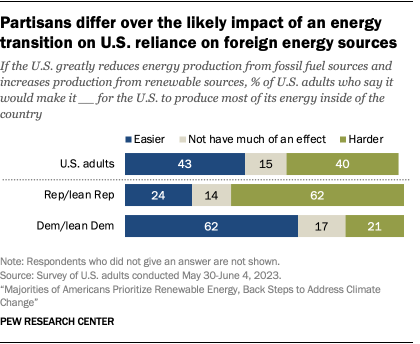
A 62% majority of Republicans think that energy independence from other countries would be harder with a major shift to reliance on renewable energy sources. By contrast, 62% of Democrats think that energy independence would be easier.
The Center survey asked about a number of potential consequences from shifting away from fossil fuels and toward renewable energy sources.
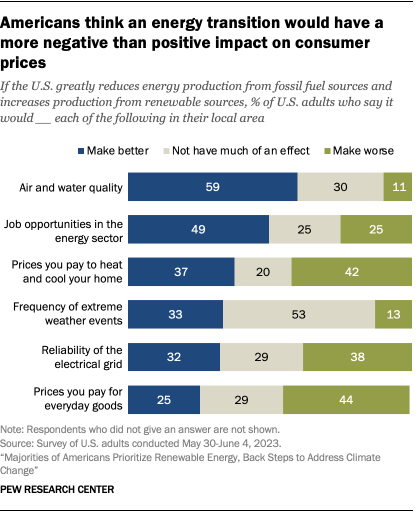
Americans are most optimistic about how an energy transition would impact environmental quality: 59% think that air and water quality would get better if the U.S. greatly reduced fossil fuel energy production and increased production from renewable sources. Three-in-ten say this energy transition would not have much effect on air and water quality, while 11% say it would make air and water quality worse.
On balance, more Americans think a renewable energy transition would make local job opportunities in the energy sector better (49%) than worse (25%).
Concerns are more pronounced when it comes to prices. Slightly more Americans think an energy transition would make the prices they pay to heat and cool their homes worse (42%) than better (37%). And by a wider margin (44% to 25%) Americans think such a transition would make prices for everyday goods worse than better.
Democrats have a largely positive outlook on what an energy transition would mean for the country. Majorities think it would improve air and water quality (80%) and local job prospects in the energy sector (68%). And, on balance, more think it would help than hurt the frequency of extreme weather events, prices to heat and cool homes, and the reliability of the electrical grid.
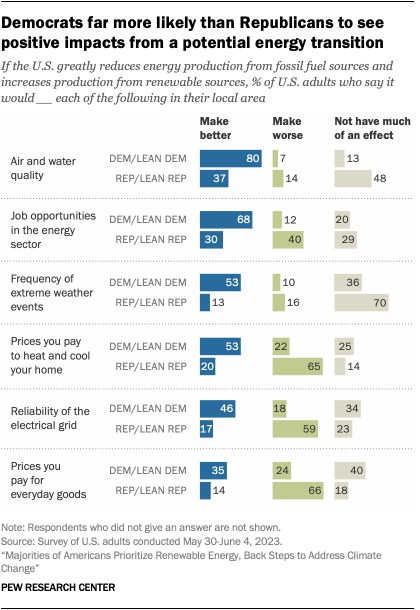
Still, Democrats do have some reservations about the impact on consumer prices: 35% think a major shift toward renewable energy would make prices for consumer goods better. About one-quarter (24%) say this shift would make prices worse and four-in-ten think it would not have much of an effect.
Republicans are largely pessimistic about the likely effects of an energy transition.
Two-thirds of Republicans (66%) think consumer prices would get worse, as would home heating and cooling costs (65%). Roughly six-in-ten Republicans (59%) expect the reliability of the electric grid to go down.
And there’s skepticism toward environmental benefits: 48% say a transition would not have much effect on air and water quality, and 70% think there would be no effect on the frequency of extreme weather events.
CORRECTION (May 22, 2025): A previous version of this report misstated the percentage of Democrats who said shifting to renewable energy would make prices of consumer goods worse in the body text. The accompanying chart gave the correct figure (24%).
Republican support for increasing wind and solar power, while still a majority, continues to edge downward
Americans remain broadly in favor of expanding solar and wind power: 82% of U.S. adults favor more solar panel farms and 75% favor more wind turbine farms. A smaller majority of Americans (57%) favor expanding nuclear power. Support for expanding other energy sources is lower: Fewer than half support more offshore oil and gas drilling (47%), hydraulic fracturing (44%) or coal mining (38%). Refer to the Appendix for details.
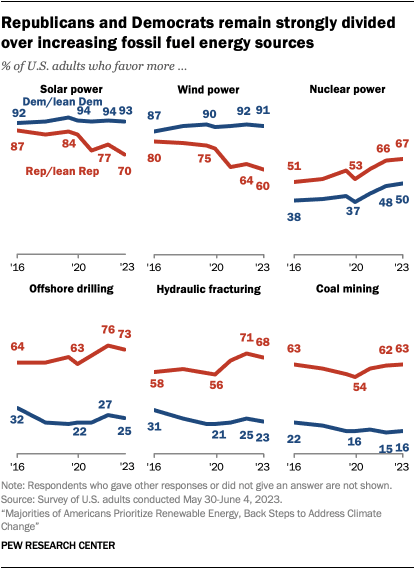
Democrats and Republicans remain deeply divided over fossil fuel development. There’s more common ground when it comes to renewables, though the partisan gap over expanding wind and solar power has been widening.
As of 2020, overwhelming majorities of both Democrats and Republicans were in favor of more solar and wind power. Since that time, Republican support has declined.
In the new survey, 93% of Democrats say they favor more solar panel farms, compared with 70% of Republicans. The share of Republicans who favor more solar power is down 14 percentage points since 2020 and 7 points since the survey last year.
Six-in-ten Republicans favor more wind power in the new survey, down 15 points since 2020 and 4 points in the last year. Meanwhile, 91% of Democrats favor more wind turbine farms.
The drop in support for solar and wind power has been especially pronounced among conservative Republicans. The share of conservative Republicans who favor more solar power is down 17 points from 2020 (from 80% to 63%) and the share who favor more wind power is down 18 points (from 69% to 51%) over the same time period.
Partisan differences remain wide over support for increasing fossil fuel energy sources. For example, 73% of Republicans favor more offshore oil and gas drilling, while just 25% of Democrats favor this.
There are similarly wide partisan differences over expanding hydraulic fracturing for oil and natural gas (68% of Republicans favor vs. 23% of Democrats) and coal mining (63% of Republicans vs. 16% of Democrats).
Republicans’ levels of support for more hydraulic fracturing, offshore drilling and coal mining have all moved about 10 points higher since 2020.
Republicans remain more likely to favor expanding nuclear power plants than Democrats (67% vs. 50%). Support for nuclear power has increased in both party coalitions in recent years. Men also continue to be far more likely than women to favor expanding nuclear power plants (71% vs. 44%).
A majority of Republicans who have heard of the Willow oil drilling project favor the Biden administration decision, while Democrats aware of the project oppose it
In March, the Biden administration approved the Willow oil drilling project on lands located in the federally owned National Petroleum Reserve in Alaska.
While the approval drew wide criticism from climate activists, the Center survey finds limited familiarity with the project. Just 3% of Americans say they have heard or read a lot about it and 29% say they have heard or read a little. About seven-in-ten (68%) say they have heard or read nothing at all about the Biden administration approving the Willow project.
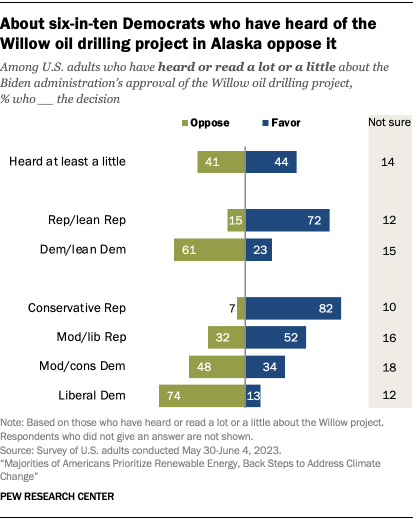
Among those with at least a little awareness of this, 44% say they favor the Biden administration approving the drilling project, while 41% oppose it. The remaining 14% say they are not sure of their view on this.
In contrast to public views of Biden’s job approval and handling of other issues, a majority of Republicans (72%) with some awareness of the Willow project say they favor the decision.
A majority of Democrats familiar with the project oppose the Biden administration’s decision (61%).
These patterns are broadly in keeping with partisan views on energy priorities for the country and support for more offshore oil and gas drilling.
Differences among Republicans by ideology, age over views about fossil fuels and prioritizing renewable energy sources
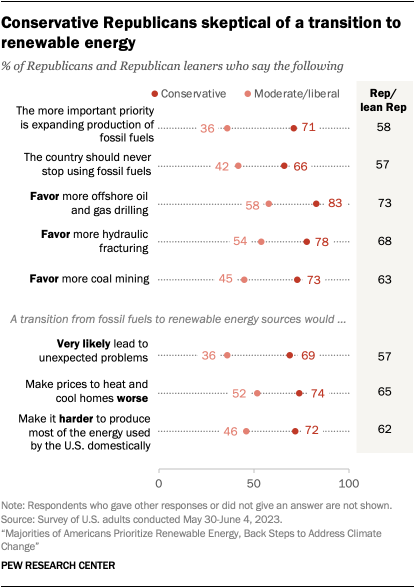
Views among Republicans about these issues are far from uniform. Conservative Republicans are far more likely than moderate or liberal Republicans to support expanding fossil fuel energy sources.
For example, 71% of conservative Republicans favor prioritizing the production of fossil fuels over the development of alternative energy sources. Moderate and liberal Republicans tilt the other direction, with 36% saying they would prioritize fossil fuels and a majority (63%) saying they would prioritize development of alternative energy sources.
Similarly, a 73% majority of conservative Republicans favor more coal mining while 54% of moderate and liberal Republicans oppose this.
Age differences among Republicans are also common in views about energy issues, with older Republicans more likely than younger Republicans to support the continued use of fossil fuels. These differences hold even when controlling for ideology.
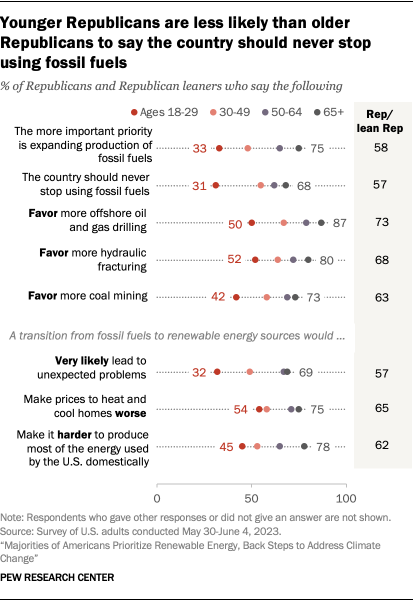
For example, 31% of Republicans ages 18 to 29 say the country should never stop using fossil fuels. In comparison, a majority of older Republicans (including 68% of Republicans ages 65 and older) say this.
Republicans under 30 are far less convinced that unexpected problems are ahead in a future energy transition that greatly reduces energy production from fossil fuel sources and increases production from renewable sources: 32% say unexpected problems are very likely, compared with 69% of Republicans ages 65 and older.
Past Center surveys have also found large differences between older and younger Republicans in views on energy issues and climate policy.
Majority of Americans continue to oppose phasing out gasoline cars and trucks by 2035
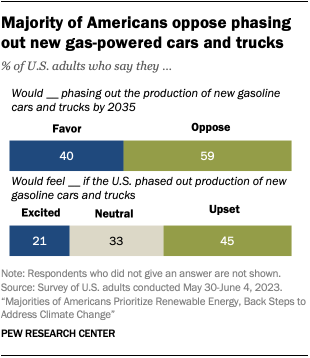
A majority of Americans remain opposed to phasing out gasoline cars and trucks by 2035. In the new survey, 40% of Americans favor this idea while 59% oppose it. The share of Americans who support phasing out gasoline cars and trucks is down 7 percentage points since 2021. Over this period of time, support for phasing out gasoline cars and trucks has ticked down among both Democrats and Republicans. Refer to the Appendix for this data.
When asked about their general reaction to the idea of phasing out the production of gas-powered vehicles, just 21% of Americans say they would be excited by the prospect. More than twice as many (45%) say they would be upset; 33% say their feelings would be neutral.
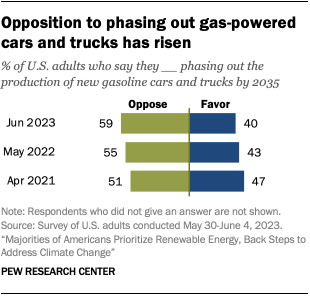
The U.S. transportation sector is the largest contributor to carbon emissions, and a majority of those emissions come from gasoline-powered passenger cars and trucks. In April, the Biden administration proposed new emission limits for automakers that would dramatically reduce the number of gasoline-powered cars and trucks automakers could sell. Several states are planning to ban the sale of gasoline cars and trucks after 2035.
Republicans oppose phasing out gasoline cars and trucks by 2035 by a large margin (84% to 16%). But views among Democrats are largely supportive: 64% favor phasing out gasoline cars and trucks, while 35% oppose this idea.
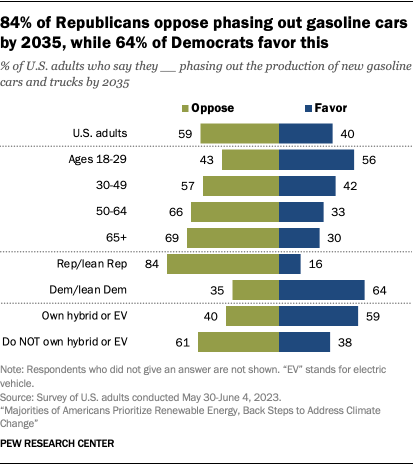
Liberal Democrats are especially supportive of phasing out gasoline cars and trucks (76% favor), while moderate and conservative Democrats are more closely divided (53% favor, 46% oppose).
Across both parties, younger Americans are more supportive of this shift. Among all adults under age 30, a 56% majority favor phasing out gasoline cars and trucks by 2035, while 43% oppose this. By contrast, majorities of adults ages 30 and older oppose phasing out gasoline cars and trucks. For instance, among those ages 65 and older, 69% oppose this idea.
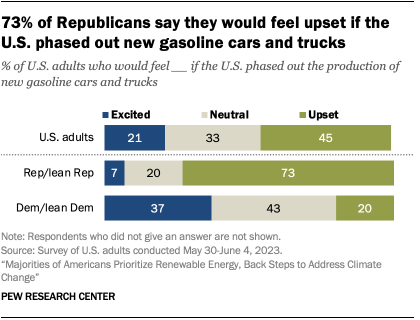
There are also wide differences in emotional reactions to the idea of phasing out the production of combustion-engine vehicles.
About three-quarters of Republicans (73%) say they would feel upset if gas cars were phased out. Among Democrats, a larger share say they would feel excited (37%) than upset (20%), while 43% of this group says they would feel neutral about the change.
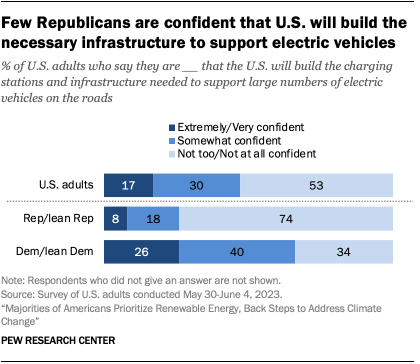
While the Biden administration has attempted to develop electric vehicle (EV) infrastructure, Americans have limited confidence that the country will build a network of charging stations to support these vehicles.
Just 17% of Americans say they are extremely or very confident that the U.S. will build the necessary charging stations and infrastructure while 30% are somewhat confident; 53% say they are not too or not at all confident.
Legislation passed during the Biden administration set aside $5 billion to build a network of charging stations. Many EV drivers find the current public charging system difficult. Republicans are particularly skeptical that the U.S. will build the charging stations and infrastructure needed to support EVs: 74% have not too much or no confidence this will happen.
38% of Americans would consider an electric vehicle for their next purchase; half say they would be unlikely to do this
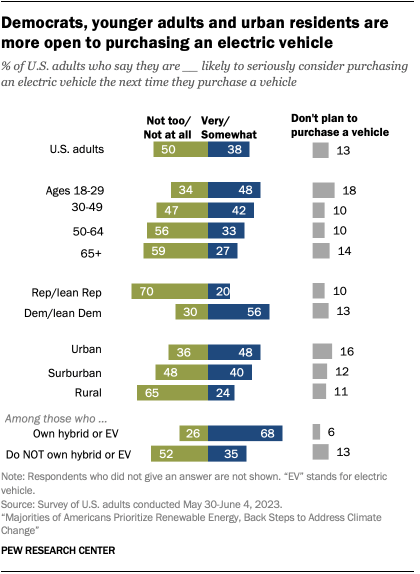
Americans are cool to the idea of making an electric vehicle purchase in the near term. Half of U.S. adults say they are not too or not at all likely to seriously consider an EV the next time they purchase a car or truck.
By comparison, 38% of Americans say they are very (15%) or somewhat (23%) likely to seriously consider an EV for their next vehicle purchase.
The public’s modest enthusiasm for purchasing an EV themselves is in line with their opposition to phasing out gas-powered vehicles. Interest in purchasing an EV is down 4 percentage points from when it was last measured in a 2022 Center survey.
Those most inclined to consider purchasing an electric vehicle in the future include the relatively small share of Americans (9%) who already own a hybrid or electric vehicle; 68% of this group says they are at least somewhat likely to seriously consider this, including four-in-ten who say they are very likely to do so.
Other groups who are more open to purchasing an EV in the future include Democrats (56% say they are at least somewhat likely to give this serious consideration), people who live in urban areas (48%), and young adults ages 18 to 29 (48%).
On the other hand, a majority of Republicans (70%), those who live in rural areas (65%) and adults ages 65 and older (59%) say they are not too or not at all likely to seriously consider an electric vehicle for their next purchase.
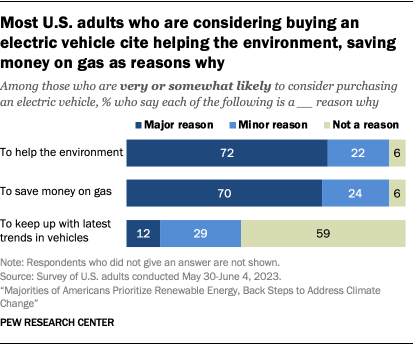
Americans who are at least somewhat likely to purchase an EV in the future say that both environmental benefits and cost savings are an attraction. About seven-in-ten of this group say that helping the environment (72%) and saving money on gas (70%) are major reasons to purchase an electric vehicle.
A much smaller share of those at least somewhat likely to consider purchasing an EV say that “keeping up with the latest trends in vehicles” is a consideration.
U.S. homeowners have a limited appetite for converting home systems to electric
There’s modest interest among homeowners in steps that would improve the energy efficiency of their homes by doing things like converting gas stoves and water heaters to electric. Some steps garner more appeal than others, however, and many have considered upgrading (or have already upgraded) their home’s insulation.
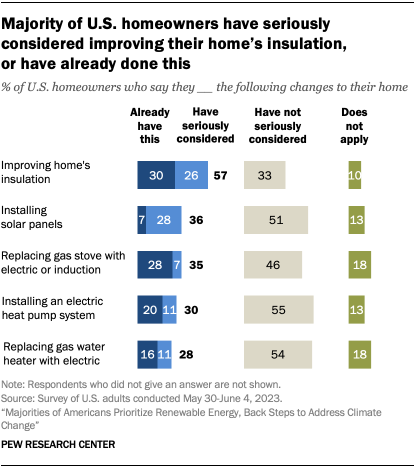
Three-in-ten homeowners say they have improved their home’s insulation in the past and another 26% say they have seriously considered doing so in the past year. A third of homeowners say they have not seriously considered a home insulation upgrade and 10% say this does not apply to their situation.
About three-in-ten homeowners (28%) say they have seriously considered installing solar panels on their home in the past year; 7% of homeowners say they already have home solar panels.
Homeowners living in the West are more likely to say they have solar panels. Democratic homeowners across all regions are more likely than their Republican counterparts to say they have seriously considered installing solar panels within the past year. These patterns are in keeping with a 2022 Center survey. (Note that the response options in the new survey include an option to specify that installing solar panels “does not apply to me,” thus the percentages are not directly comparable across the two surveys.)
Relatively small shares of homeowners say they have seriously considered replacing their gas oven or stove with an electric or induction system (7%), installing an electric heat pump system to heat and cool their home (11%), or replacing their gas water heater with an electric system (11%).




